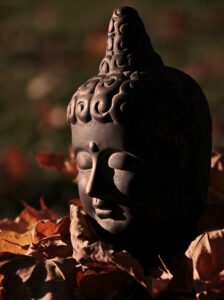Devotional about Taoism
Taoism and Biblical Principles
The Way of Harmony
Just as Taoism teaches the importance of living in harmony with the natural order, the Bible also emphasizes the concept of peace and reconciliation. In Matthew 5:9, Jesus said, “Blessed are the peacemakers, for they will be called children of God.” Both Taoism and the Bible encourage us to seek harmony in our relationships and the world around us.
Humility and Simplicity
In Taoism, the idea of being humble and living a simple life is highly valued. This echoes the biblical principle found in Philippians 2:3-4, which states, “Do nothing out of selfish ambition or vain conceit. Rather, in humility value others above yourselves, not looking to your own interests but each of you to the interests of the others.” Both traditions emphasize the virtue of humility and simplicity as a path to spiritual fulfillment.
Living in the Present Moment
Taoism teaches the importance of being present in the moment, free from the distractions of the past and the worries of the future. Similarly, the Bible encourages us to trust in God’s provision and live each day with faith and gratitude. In Matthew 6:34, Jesus said, “Therefore do not worry about tomorrow, for tomorrow will worry about itself. Each day has enough trouble of its own.” Both Taoism and the Bible remind us to focus on the present moment and trust in the divine plan.
Seeking Inner Peace
Both Taoism and the Bible emphasize the importance of seeking inner peace and contentment. In Philippians 4:7, the apostle Paul writes, “And the peace of God, which transcends all understanding, will guard your hearts and your minds in Christ Jesus.” This parallels the Taoist idea of cultivating inner harmony and stillness. Both traditions offer wisdom on finding peace within ourselves amidst life’s challenges.
The Way of Love
Finally, both Taoism and the Bible teach the central importance of love. In 1 Corinthians 13:13, it says, “And now these three remain: faith, hope and love. But the greatest of these is love.” Taoism similarly emphasizes the power of love in cultivating compassion, empathy, and connection with all living beings. Both traditions call us to live a life rooted in love and kindness.
Journal Prompts
- How can I cultivate more humility and simplicity in my daily life?
- What are the distractions that hinder my ability to live in the present moment? How can I address them?
- What practices or habits bring me inner peace and contentment?
Prayer
Dear Heavenly Father, Thank you for teaching me the importance of harmony, humility, and love. Help me to live in alignment with your will and seek inner peace. Guide me in cultivating a spirit of humility and simplicity, and fill my heart with your love. In Jesus’ name, Amen.
Social Posts
1. “Living in harmony with the natural order brings peace and fulfillment to my heart. #Taoism #BiblicalPrinciples”
2. “Simplicity and humility bring clarity and purpose to my life. #InnerPeace #FaithInAction”
3. “Today, I choose to focus on the present moment, trusting in God’s plan for my life. #Trust #FaithWalk”
[email-subscribers-form id=”1″]
Q&A about Taoism
Q: What are the key beliefs of Taoism?
A: Taoism believes in the concept of the Tao, or the way, which is the natural order of the universe. It also emphasizes living in harmony with nature and practicing humility.
Q: What are some important texts in Taoism?
A: The Tao Te Ching, written by Lao Tzu, is one of the most important texts in Taoism. Another important text is the Zhuangzi, attributed to the philosopher of the same name.
Q: Are there any specific practices or rituals in Taoism?
A: Taoism includes practices such as meditation, qigong, and tai chi. There are also rituals such as offerings to ancestors and deities, as well as ceremonies for important life events.
Q: How does Taoism view the concept of yin and yang?
A: In Taoism, yin and yang represent the dualistic nature of the universe, with yin representing the feminine, passive, and dark aspects, and yang representing the masculine, active, and light aspects. Taoism teaches the importance of balancing these polarities.
Q: Is there a specific deity or deities in Taoism?
A: Taoism does not have a central deity, but it does recognize a pantheon of deities and immortals. However, the focus is more on living in harmony with the natural order of the universe rather than worshiping specific gods.

